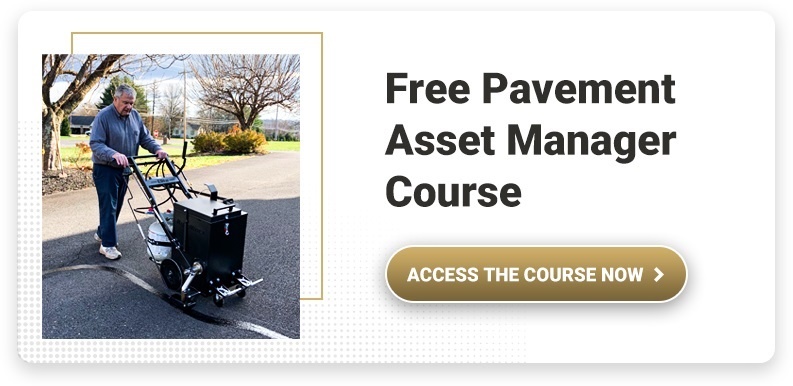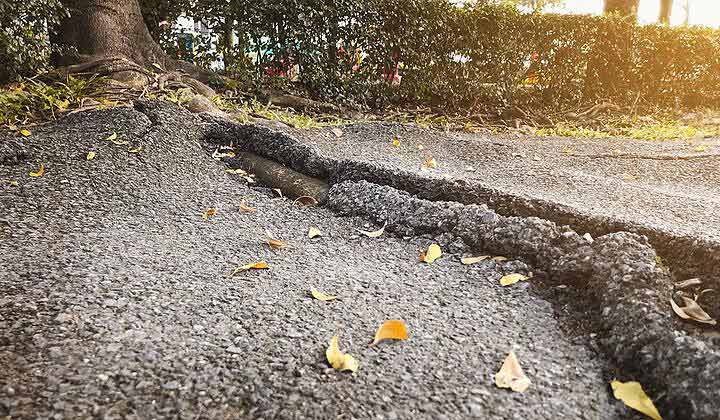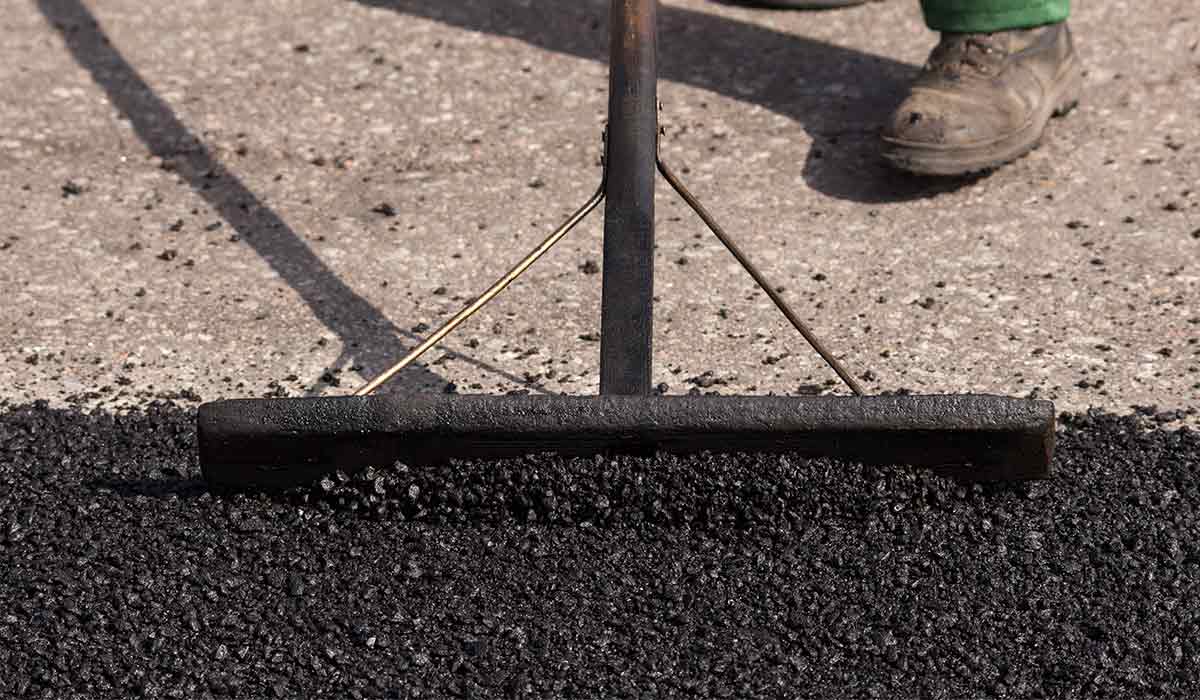Planning to have a driveway installed in your new home? Or have your old and damaged driveway demolished to give way to a new one? Are you torn between an asphalt driveway and a concrete one?
In this blog, we're going to discuss
- What are asphalt and concrete driveways?
- The pros and cons of asphalt and concrete driveways
- Answers to commonly asked questions about blacktop vs. concrete driveways
FREE DOWNLOAD!

Get your FREE ebook on how not to ruin your asphalt
Table of Contents
- What is Asphalt?
- What is concrete?
- Pros and Cons of Asphalt Driveways
- Pros and Cons of Concrete Driveways
- How Can You Tell If You Have an Asphalt or Concrete Driveway?
- Can You Sealcoat Asphalt?
- Can You Sealcoat Concrete?
- Is Asphalt or Concrete Better for Your Driveway?
- Can Color Be Added to Asphalt?
- What Business Opportunities Are Associated With Each Material?
- Can I Do My Own Asphalt or Concrete Driveway Installation?
- How often should you apply sealer to an asphalt driveway?
- How often should you apply sealer to a concrete driveway?
- Conclusion
What is Asphalt?
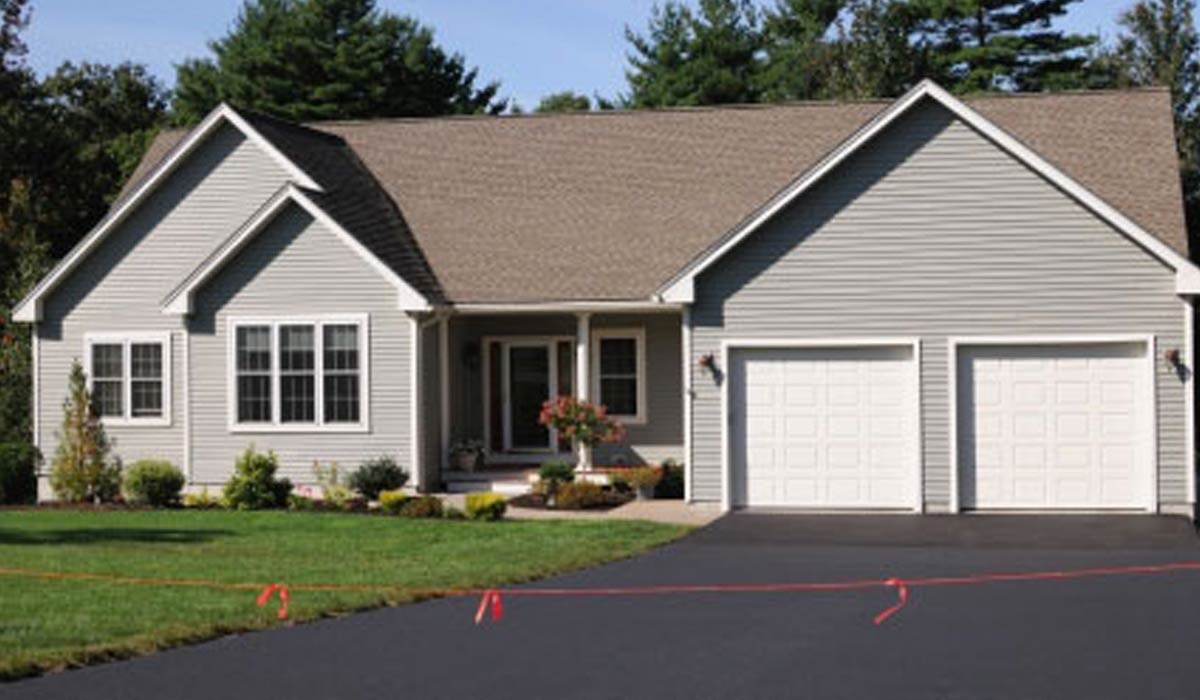
Asphalt driveways are the red carpet for your house
To understand what asphalt is, let's first take a look at its components. Let's start with bitumen.
Bitumen (or what we commonly know as asphalt) is a type of liquid cement used as a binder in road, parking lot, and driveway construction. It is also used as a waterproofing, sealing, and insulating agent.
Bitumen is extracted from asphalt lakes or from oil sands. It can also be refined from crude oil. This viscous black liquid is heated, mixed with aggregates, and then used to pave roads, parking lots, and driveways.
How is an asphalt driveway installed? First, your contractor will start compacting the ground to ensure the base is stable. Next, hot asphalt mix will be poured on the driveway and spread evenly using a lute, rake, or wheel loader. Finally, the newly installed asphalt driveway will be compacted using an asphalt roller.
Another aspect of discussing asphalt vs. concrete driveways involves talking about aggregates. Aggregates in asphalt pavements are composed of sand, stone dust, and small crushed stones. If bitumen is the binder, then these crushed rocks and sand make up the pavement's structure.
What is concrete?
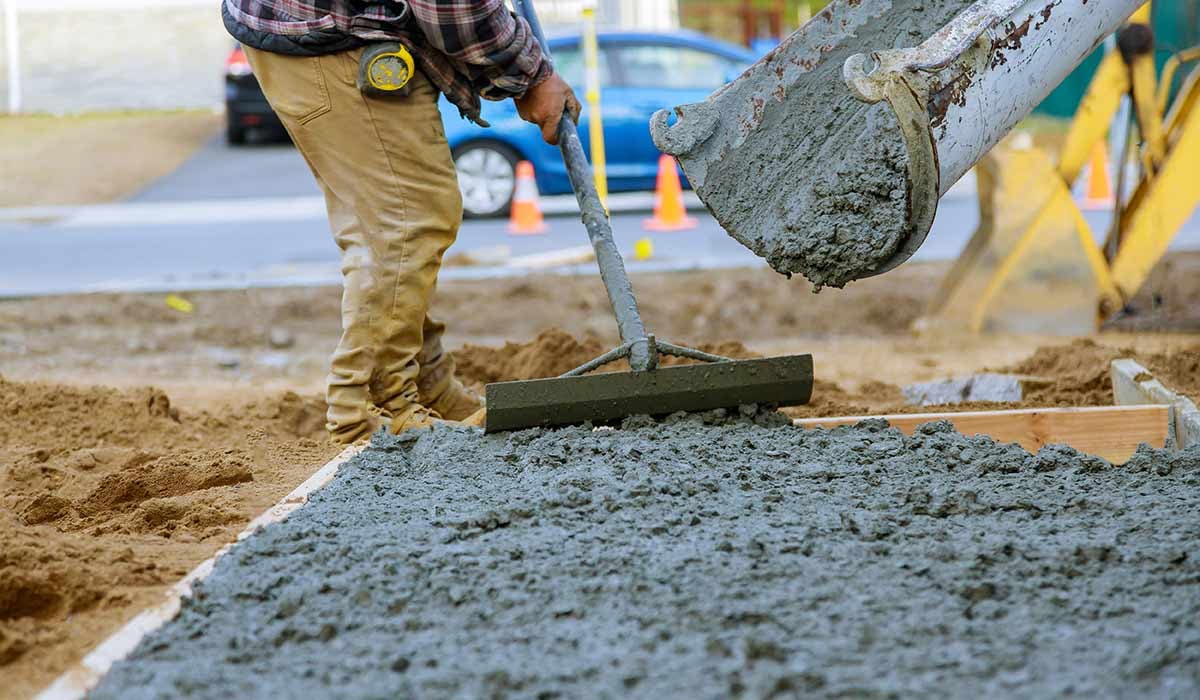
Just like asphalt pavements, concrete is made up of aggregates (sand and crushed stone) that serve as fillers and add volume. A crucial distinction when comparing asphalt and concrete driveways involves their binders. Concrete uses a mixture of water and cement as its binder. Asphalt doesn’t.
Versatility may also be important when comparing blacktop vs. concrete driveways. Concrete is amazingly versatile. It can be used to build roads, bridges, sidewalks, and, of course, driveways. It's also used to build pools, homes, and more.

Video: Asphalt vs Concrete
Pros and Cons of Asphalt Driveways
|
Pros |
Cons |
|
More affordable than concrete driveways |
It has a shorter lifespan than concrete |
|
Durable |
It can get really hot in the summer |
|
Easy to maintain and repair |
Customization is limited |
|
Can be used immediately |
|
|
Can be recycled |
Pros
1. Affordability
The first thing the majority of homeowners and commercial property owners consider when comparing asphalt vs. concrete driveways is the cost. So, if you're on a tight budget but you still need a driveway that will last for decades, then asphalt is the way to go.
How much does an asphalt driveway typically cost?
First, let's talk about the cost of the materials. Hot asphalt mix typically costs $3 to $6 per square foot. Next, you need to factor in labor, which can cost anywhere between $5 and $7 per square foot.
Other factors that can affect the total cost of asphalt vs. concrete driveway installation include:
- The size of the driveway
- The difficulty of installation
- Whether excavation and grading are required
- The amount of surface preparation required
- The type of terrain your property sits on
- How thick do you want the asphalt driveway to be
All in all, you're looking to spend anywhere between $7 and $13 for each square foot of asphalt.
Related: How Proper Asphalt Maintenance Can Prevent Parking Lot Accidents
2. Lasts for many years
With proper care and regular sealcoating, asphalt driveways should last up to 30 years.
3. Easy to maintain and repair
To ensure its longevity, an asphalt driveway needs to be repaired and maintained regularly.
The good news is that fixing and maintaining an asphalt driveway is very easy. Alligator cracking can be patched with products like Gator Patch. Larger cracks, on the other hand, can be filled with liquid or hot pour rubber crack filler. Potholes are patched with cold patch or by using an infrared asphalt heater. To keep an asphalt driveway in great shape for many years, you can apply sealer every two to three years.
Keen on DIY asphalt maintenance? Unlike concrete driveways, asphalt is DIYer-friendly, making it more cost-effective for homeowners and commercial property owners in the long term.
4. An asphalt driveway can be used immediately after it is laid out
Need to use your driveway immediately, but aren’t sure whether to choose a blacktop or concrete driveway? The former is your best bet. You can walk on a freshly laid asphalt driveway immediately, and you will only need to wait 3 days before you can drive on it. If you live in a desert or tropical area, then you need to wait a little longer before driving on it.
What about parking? We recommend that you wait at least two weeks before parking your vehicle on your new asphalt driveway.
5. It can be recycled
Did you know that asphalt is one of the most commonly recycled materials on earth?
According to the National Asphalt Pavement Association, as much as 87 million tons of reclaimed asphalt were recycled in 2020 alone. Plus, over 90% of the asphalt reclaimed from the old mixture is turned into new pavements. A major plus when looking at the pros and cons of an asphalt driveway is that it’s more environmentally friendly than other types of construction material.
Cons
1. It has a shorter lifespan than concrete
But the good news is it's possible to extend the lifespan of asphalt simply by regularly applying sealcoating. Fixing cracks and not letting them deteriorate into potholes is another reliable way to prevent early asphalt deterioration.
2. The surface can get really hot in the summer
A con of asphalt is that its dark color absorbs sunlight and releases it slowly, while concrete's lighter color reflects it. This makes asphalt up to 10 degrees hotter than concrete. While you'll be fine if you're inside your vehicle, it can get scorching hot if you're walking on hot asphalt with flip-flops or any footwear with thin soles. Also, refrain from walking your pets in the middle of the day during summer, as the asphalt can blister their paws.
3. Design and customization for asphalt are quite limited
But when it comes to adding some design to asphalt, your options are quite limited. You can have asphalt stamped, painted, and stenciled. You can also have asphalt pavements inlaid with thermoplastic.
Pros and Cons of Concrete Driveways
|
Pros |
Cons |
|
Lasts up to 50 years with proper care |
Needs to be replaced when large cracks appear |
|
Easy to clean |
Can't use the driveway right after installation |
|
A bit cooler than asphalt |
Installation process takes longer |
|
Can be customized in many ways |
More expensive |
|
Easy winter maintenance |
Pros
1. Concrete driveways last for many decades
Concrete's mix of cement, aggregates, and water makes it one of the most durable materials used in the construction industry. With proper care, a driveway made of concrete should last up to 50 years, which may give this option the leg up when comparing asphalt vs concrete driveways.
2. Cleaning a concrete driveway is very easy
One of the biggest pros of owning a concrete driveway is that it is easy to maintain. Use a broom to sweep off dirt, dust, leaves, and other debris. You can also use soap and water to get rid of deep-seated dirt. Pressure wash the entire surface to remove moss and other hard-to-remove dirt.
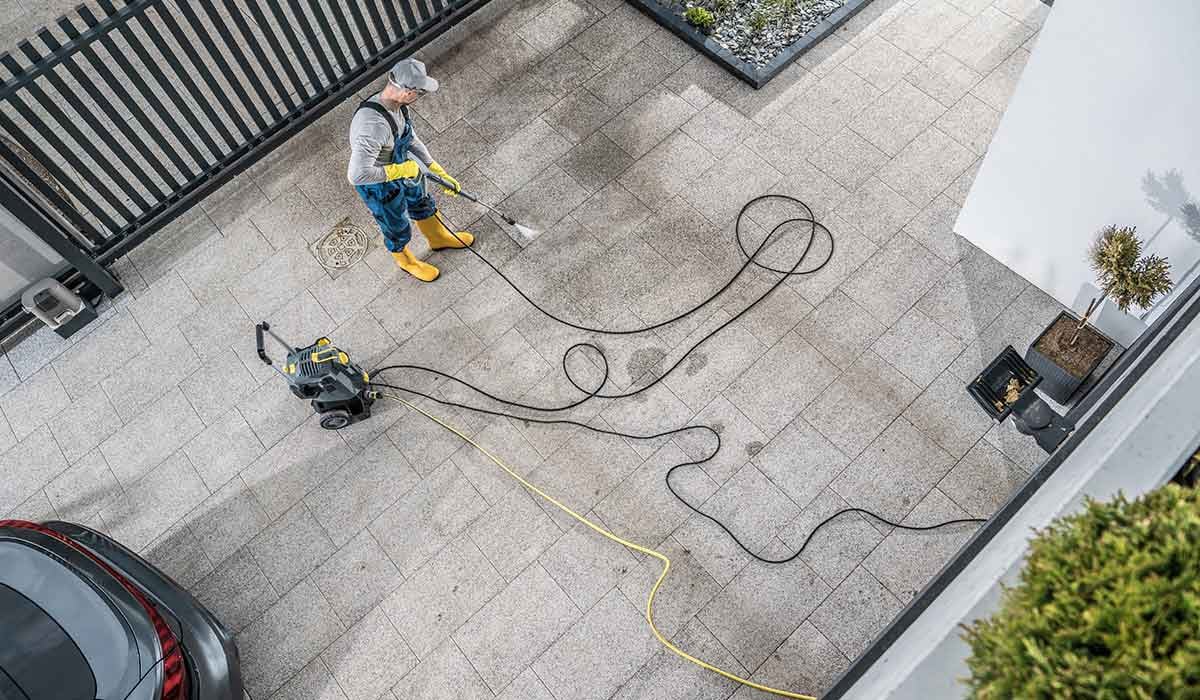 Concrete can get pressure-washed for cleaning
Concrete can get pressure-washed for cleaning
Related: How to Prevent Parking Lot Accidents in Winter
3. It's cooler in the summer
Unlike asphalt driveways, concrete's light gray color allows it to reflect sunlight instead of absorbing it. This makes concrete driveways considerably cooler by several degrees than asphalt.
That doesn't mean asphalt doesn't get hot, especially during midday. If you plan to go for a walk at noon, then wear appropriate footwear to protect your feet. Refrain from walking your pets during the middle of the day during summer, as the surface will still be too hot.
4. It can be customized in many ways
Customizability can be a vital factor when deciding between a blacktop or concrete driveway. The beauty of concrete is that you can easily customize it to stand out. You can have it stenciled, etched, stamped, or you can opt to have the aggregates exposed. You can also choose different finishes for concrete, including salt, sponge, and machine trowel finishes. You can also have the concrete polished and stained, dyed, or tinted with your chosen color.
5. Easy winter maintenance
Concrete is an extremely durable material, but the repeated freeze-thaw cycle during winter can damage it. The good news is that it's easy to maintain concrete driveways and parking lots during winter. Just have them sealed every couple of years or so, and remove snow whenever you can. You're good to go. Also, refrain from using de-icing salts to keep them in great shape for longer.
Cons
1. Repairing concrete driveways can be tricky
The process of fixing cracks in asphalt is pretty straightforward. Just apply liquid or hot pour rubber crack filler and you're all set. Patching alligator cracks? Simply use Gator Patch or your choice of asphalt patching products.
When comparing asphalt vs. concrete driveways, repairing the latter can be tricky. Minor concrete damage can be remedied by having it resurfaced. But for major damage, such as heaving or expansion cracks, you'll need to have the slab replaced entirely.
2. You will not be able to use your concrete driveway right away
A pro of an asphalt driveway (and a con for concrete driveways) involves drying times.
While you can walk on freshly laid asphalt right away, concrete is different and requires a little more patience.
How long should you wait before using a concrete driveway?
It is recommended to wait at least 48 hours before walking on it and at least seven days before driving on it.
3. Installing a concrete driveway takes longer
Pouring a concrete driveway is more complicated than installing an asphalt one. Your contractor needs to prep the area, install the formwork, reinforce the driveway with steel rebars, and then pour the concrete mix.
Then, they need to make sure that everything is evenly spread out and start smoothing out the concrete surface. Next, you need to let it dry and wait a couple of days before walking on it. If you need the
4. Installation is more expensive
It costs $4 to $15 per square foot to lay a concrete driveway. The price can sometimes go up if you choose to have the concrete stained, stenciled, or stamped.
How Can You Tell If You Have an Asphalt or Concrete Driveway?
It’s easy to tell if you have a blacktop or a concrete driveway. Asphalt has this distinct and easily recognizable black or dark gray color, while a concrete driveway has a medium or light gray appearance.
Asphalt also has a rougher surface, while concrete has a smoother texture and appearance (except when you have an exposed aggregate driveway).
Concrete driveways have smooth edges, while asphalt has rough ones.
Related: 7 Best Asphalt Sealer Removal Products
Can You Sealcoat Asphalt?
Yes, you can apply sealer to asphalt. In fact, we recommend asphalt sealer application every two to three years to protect your asphalt from the sun’s UV rays, rainwater, snowmelt, and oxidation.
Can You Sealcoat Concrete?
Yes, you can apply a concrete sealer to concrete driveways. Concrete is a highly porous material. So, a good coat of sealer prevents water from penetrating and damaging not only the concrete itself but also the steel reinforcement underneath.
In addition, the sealer also acts as a shield against deicing salts and other chemicals that can cause corrosion.
However, we don't recommend using a blacktop sealer for concrete. Likewise, concrete sealers will not work for asphalt because they won't provide the rejuvenators that will prolong the asphalt's life.
Is Asphalt or Concrete Better for Your Driveway?
The answer depends on your location and the climate in your area. Concrete is ideal for properties located in states with tropical or dry climates. If you live in a state with a temperate or continental climate, then an asphalt driveway is the way to go.
Another consideration when choosing the right driveway for your property is the cost. As mentioned above, concrete is more expensive than asphalt. So if the budget is a little tight but you want something that will last for decades, then asphalt is the best choice.
Can Color Be Added to Asphalt?
Yes, you can add color to an asphalt driveway by using colored crushed rocks or recycled glass. Property owners can also use colored sealers and asphalt coatings to add color to the driveway.
What Business Opportunities Are Associated With Each Material?
Asphalt Services
- Sealcoating
- Crack Repair
- Pothole Patching
- Line Striping
- Athletic Field Painting
Concrete Services
- Decorative Concrete
- Concrete Overlay
- Resurfacing
- Concrete Cleaning and Repair
- Concrete Sealing
- Line Striping
- Pressure Washing
If you are interested in starting a pavement asset maintenance business, the Asphalt Kingdom Build Your Own Business Blueprint is an ideal place to start for free.
Can I Do My Own Asphalt or Concrete Driveway Installation?
We advise against conducting DIY asphalt or concrete driveway installation. The whole installation process might look like a piece of cake when you watch it on video, but it really is not. A concrete driveway, in particular, requires precision when it comes to mixing cement, water, and aggregates.
Plus, chances are you don't have most of the tools and equipment used to install a blacktop or concrete driveway. You need to rent it from an equipment rental company, but why go through the hassle if you can hire a pro instead?
Related: Asphalt Crack Cleaning Tools and Equipment For Surface Prep
How often should you apply sealer to an asphalt driveway?
Asphalt sealer protects your driveway from the harmful effects of the sun’s UV rays. It also seals out rainwater/snowmelt and prevents cracks from forming. We recommend that you hire a contractor to seal the driveway every two to three years.
Tip: You can conduct DIY asphalt sealing. Read this blog for complete information on how to sealcoat asphalt.
How often should you apply sealer to a concrete driveway?
Concrete sealer protects the driveway from wear and tear, oil stains, and chemicals that can damage it. It also makes the concrete easier to clean and maintain.
That said, you can have the driveway resealed every two to five years. You can hire a pro to do this for you, or you can do it yourself.
Conclusion:
We hope that this blog helps you choose between an asphalt vs. concrete driveway for your home or place of business.
Read our other blog posts to learn more about asphalt and how you can extend its lifespan. For additional information on asphalt sealcoating, crack filling, and line striping, simply give us a call at 1-866-399-5562.


